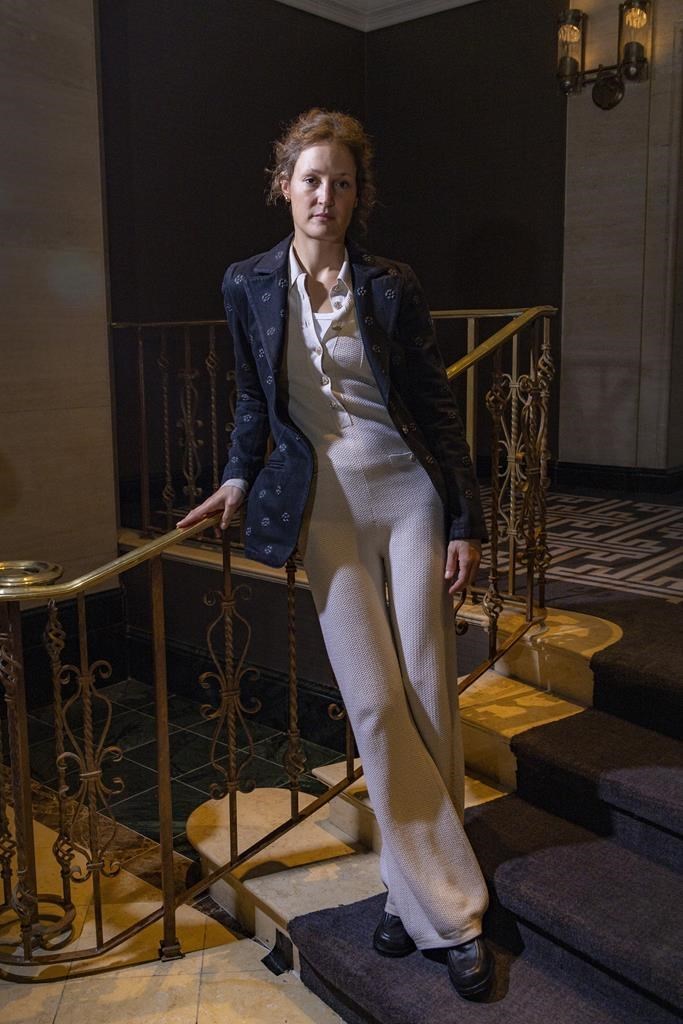TORONTO (AP) ā Vicky Krieps noticed that while thereās plenty of instruction for getting into a role, there's curiously little about getting out of one.
For Krieps, the disarmingly natural Luxembourgish actor of āPhantom Thread,ā and itās not a small issue. It may even be the most important part of the process. If she's still stuck the headspace of a character, she can't keep moving forward.
After struggling in the aftermath of her breakthrough in Paul Thomas Andersonās āPhantom Thread,ā in which she starred opposite Daniel Day-Lewis, Krieps found a solution. She could put a capstone on the character through music.
āI have to leave my characters in a peaceful way and say: Now she lives in song,ā says Krieps.
Krieps, 39, has since followed every performance by writing a song for the character. She sings and plays acoustic guitar. She's currently recording an album of those songs but she took a break to travel to the for the premiere of her latest film, directed by Viggo Mortensen.
The film, Mortensenās second and most accomplished directing effort, is a Western from a different, more feminist perspective. Mortensen plays a Danish immigrant named Holger who meets the French-Canadian Vivienne (Krieps) in San Francisco. They soon settle down in a corrupt Nevada town, but Holger is compelled to join the Union Army. Vivienne is left in their remote cabin, and is brutally raped while Holger is away.
Vivienneās song, Krieps says, is sad and dark.
āIt starts as a lullaby of a woman singing her child to sleep,ā Krieps says, sipping tea in a hotel restaurant. āAnd it always breaks off when she says, āI canāt sleep. I canāt close my eyes.ā There's the hope of him coming back. At the same time, this is something thatās been done to women over centuries.ā
āThe Dead Donāt Hurt,ā one of the highlights among the films on sale in Toronto, received from the Screen Actors Guild-American Federation of Radio and Television Artists since it was an independent production and doesnāt yet have a distributor. Krieps is also to receive a tribute award at the festival.
The film is the latest in a naturally evolving project for Krieps of playing women throughout history who reject the social conventions of their times. In last yearās she played the much constricted, independently minded 19th century Austrian Empress Elisabeth. In the ā50s-set āPhantom Thread,ā only her Alma is capable of countering a battle of wills with Day-Lewisās fastidious couturier Reynolds Woodcock. In āThe Dead Donāt Hurt,ā Vivienne packs her bags to flee after the assault, then puts them down and resolves to stay.
āAt one point you have to ask yourself: What are you living for? I do believe that something is changing for women and Iām part of this. I can tap into my grandmothers and great-grandmothers and also try to connect with whoās coming and who was before," says Krieps. "I donāt really know why. I just know thatās how it feels. I think the dialogue is broken between men and women because women learned to hide the wound.ā
Since 2017's āPhantom Thread," Krieps has emerged as one the moviesā most authentic, instinctive and defiant screen presences. It's not an act, either. Krieps, who lives in Berlin with her partner and two children, is herself a force of stubborn independence.
She doesnāt like to rehearse. Every take she does differently. Sheās willing, she says, to risk a scene being bad in order to make it real.
āAnd I believe inside: They canāt tell me what to do,ā says Krieps, smiling. āI was working with Gabriel Garcia Bernal, and he was like, āI think this director really wants us to say the lines.ā And I said, āI donāt care. They cannot tell me what to do.ā And he looked at me rather impressed.
āFor me, art is like a wild creature,ā she adds. āTo tame it, you pretend that youāre not seeing it. But, of course, I want it to come to me so badly.ā
This rebellious streak in Krieps is clearly present in other parts of her life. She describes being resentful of a streaming service that, after she had played Hitchcock, would recommend only things like āTomb Raider."
āYouāre trying to (expletive) influence me!ā she says. āAnd by chance, itās made by you as well. What a coincidence! Thatās why the system is (expletive). Itās hiding good cinema.ā
Krieps, a deeply anti-algorithm actor, has sensed that her progress in the film industry, too, could become its own construct. She has, she says, tried to work frequently with first or second-time directors. She's turned down many more Hollywood offers than she's accepted.
āIf I get too comfortable, then I might be led into superficial things as well,ā Krieps says. āAs an actor, you could be easily led into some life thatās not your life. You start thinking of who you are as an actor. āOh, Iām this guy,ā or āIām this woman. Thatās what they like me for.ā All this stuff and the gifts and the parties, the āI love youā and āI love you too!ā Itās like foam. It goes up and up and then thereās nothing left thatās actually real.ā
___
Follow AP Film Writer Jake Coyle on Twitter at:
Jake Coyle, The Associated Press



